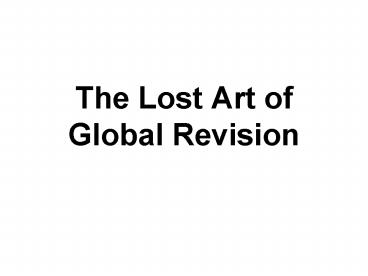The Lost Art of Global Revision - PowerPoint PPT Presentation
1 / 15
Title:
The Lost Art of Global Revision
Description:
Global revision is a true 're-seeing' of your essay's focus and/ or argument. ... Is it appropriate for your topic? Have you checked your diction for effective ... – PowerPoint PPT presentation
Number of Views:186
Avg rating:3.0/5.0
Title: The Lost Art of Global Revision
1
The Lost Art of Global Revision
2
Define revision in your own terms. . . .
3
Global revision is a true re-seeing of your
essays focus and/ or argument. When revising, it
is good to prioritize your tasks.
4
In order to revise effectively, delegate your
tasks into two categories Higher Order Concerns
and Lower Order Concerns.
5
- Higher Order Concerns are the most important.
They include - An examination of the essays thesis
- Does it have a strong idea?
- Is the essays thesis reasonably arguable?
- Could I, if needed, summarize my essay in a
single sentence?
6
Some strategies for thesis revision Ask someone
to read the first 2 paragraphs of your essay.
Ask that person to tell you what she believes
your paper will argue. If shes correct, youre
on the right track, if she cant tell you your
argument you may need to revise your thesis for
clarity.
7
- Clear organization
- Do my ideas progress logically from one to the
next? - Have I incorporated transitions into my paper to
help aid the flow of my thoughts? - Do my topic sentences contain main ideas?
- Do all my paragraphs expand upon my central idea,
or thesis statement? - Do my details and examples support my topic
sentences?
8
- Some strategies for revision of organization
- Go through the paper and jot down notes on the
topics of the various paragraphs. Look at this
list and see if you can think of a better
organization. - Make a brief outline. Does the organization make
sense? Should any part be moved to another part? - Ask someone to read the paper. At the end of each
paragraph, ask the person to forecast where the
paper is headed. If the paper goes in a direction
other than the one forecasted by the reader, is
there a good reason, or do you need to rewrite
something there?
9
- Audience
- Do you have an appropriate audience in mind? Can
you describe them? - Do you have a clear purpose for the paper? What
is it intended to do or accomplish? - Why would someone want to read this paper?
- Does the purpose match the assignment?
10
- Some strategies for revision of audience
- Examine your essays tone. Is it appropriate
for your topic? - Have you checked your diction for effective word
choices? - If you were an outsider reading this essay, would
you be satisfied by your rhetoric? Why or why
not?
11
- Development
- Have you defined all terms that laymen may not
understand? - Are there paragraphs that seem much shorter and
in need of more material than others? - If you have a few very short paragraphs, think
about whether they are really parts of a larger
paragraph--and can be combined--or whether you
can add details to support each point and thus
make each into a more fully developed paragraph.
12
- Strategies for revising an essays development
- Ask someone to read the paper and comment if
something is unclear and needs more description,
explanation, or support. - Include the definition of terms in your terms
13
Now for Lower Order Concerns Lower Order
Concerns include sentence structure, punctuation,
some word choice, and spelling.
14
- What to look for in the revision of Lower Order
Concerns - Are there a few problems that frequently occur?
Keep a list of problems that recur and check for
those. - Read the paper aloud watching and listening for
anything that sounds incorrect. - Ask yourself why you put punctuation marks in
certain places. Do you need to check any
punctuation rules? - For possible spelling errors, proofread
backwards, from the end of a line to the
beginning.
15
Global Revision clearly comprises your WHOLE
paper, and examines writing on a much deeper
level than which mere proofreading allows.































